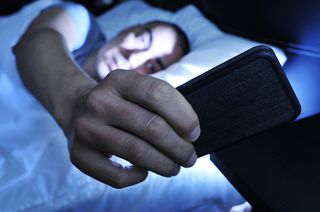Night Owls at Higher Risk of Diabetes, Other Illnesses

Night owls may enjoy staying up late, but their belated bedtimes may be a detriment to their health in middle age, a new study finds. People with late bedtimes are more likely to develop diabetes and other health problems than early birds, the researchers found.
Moreover, the health risks stayed the same even for night owls who got the same amount of sleep as early risers, according to the study, published in the Journal of Clinical Endocrinology & Metabolism.
Many night owls don't get enough sleep because they go to bed late but still need to wake up early in the morning, said the study's senior author, Dr. Nan Hee Kim, an endocrinologist at Korea University Ansan Hospital. [5 Things You Must Know About Sleep]
"These results support the importance of circadian rhythms in metabolic regulation," Kim told Live Science.
The study included 1,620 people ages 47 to 59 years old who were taking part in a large research study in Korea. The participants answered questions about their sleep-wake cycles, sleep quality and lifestyle habits, such as how often they exercised. They also gave blood samples and underwent body scans that assessed their body's fat and lean mass.
The researchers grouped the participants based on their responses; there were 480 morning people, 95 evening people and 1,045 people classified as neither.
The researchers found that the evening people were more likely than the early risers to have poor sleep quality and unhealthy behaviors such as smoking, sedentary lifestyles and eating late at night, Kim said. The night owls also tended to be younger, but were more likely to have high levels of body fat and triglycerides, or fats in their blood, than early risers. (Having high levels of fat is usually associated with older age.)
Sign up for the Live Science daily newsletter now
Get the world’s most fascinating discoveries delivered straight to your inbox.
The people who stayed up late were 1.7 times more likely to have Type 2 diabetes and metabolic syndrome, which is a set of symptoms — including high blood pressure, high blood sugar levels, too much abdominal fat and abnormal cholesterol levels — that can occur together and increase a person's risk of cardiovascular disease or diabetes.
They were 3.2 times more likely to have sarcopenia (muscle loss) compared with morning people, which was independent of how much sleep they got and their other lifestyle factors, Kim said.
However, several gender differences emerged. Male night owls had a 2.9-fold increased risk of diabetes and a 3.8-fold increased risk of sarcopenia. But female night owls had only a 2.2-fold increased risk of metabolic syndrome, a cluster of factors that raise the risk of heart disease, stroke and diabetes, the researchers found.
"Considering evening type is more prevalent in the younger age groups, these findings are [an] important major health issue," Kim said.
A person's biological clock is largely determined by genetics, age, sex and sleeping environment, but it can be modified by external or internal cues, such as light, exercise and eating behavior, Kim said.
Night owls keen on an earlier bedtime can avoid exposure to lights late at night and take melatonin, a natural chemical that helps people sleep, Kim said.
Follow Laura Geggel on Twitter @LauraGeggel. Follow Live Science @livescience, Facebook & Google+. Original article on Live Science.

Laura is the archaeology and Life's Little Mysteries editor at Live Science. She also reports on general science, including paleontology. Her work has appeared in The New York Times, Scholastic, Popular Science and Spectrum, a site on autism research. She has won multiple awards from the Society of Professional Journalists and the Washington Newspaper Publishers Association for her reporting at a weekly newspaper near Seattle. Laura holds a bachelor's degree in English literature and psychology from Washington University in St. Louis and a master's degree in science writing from NYU.
